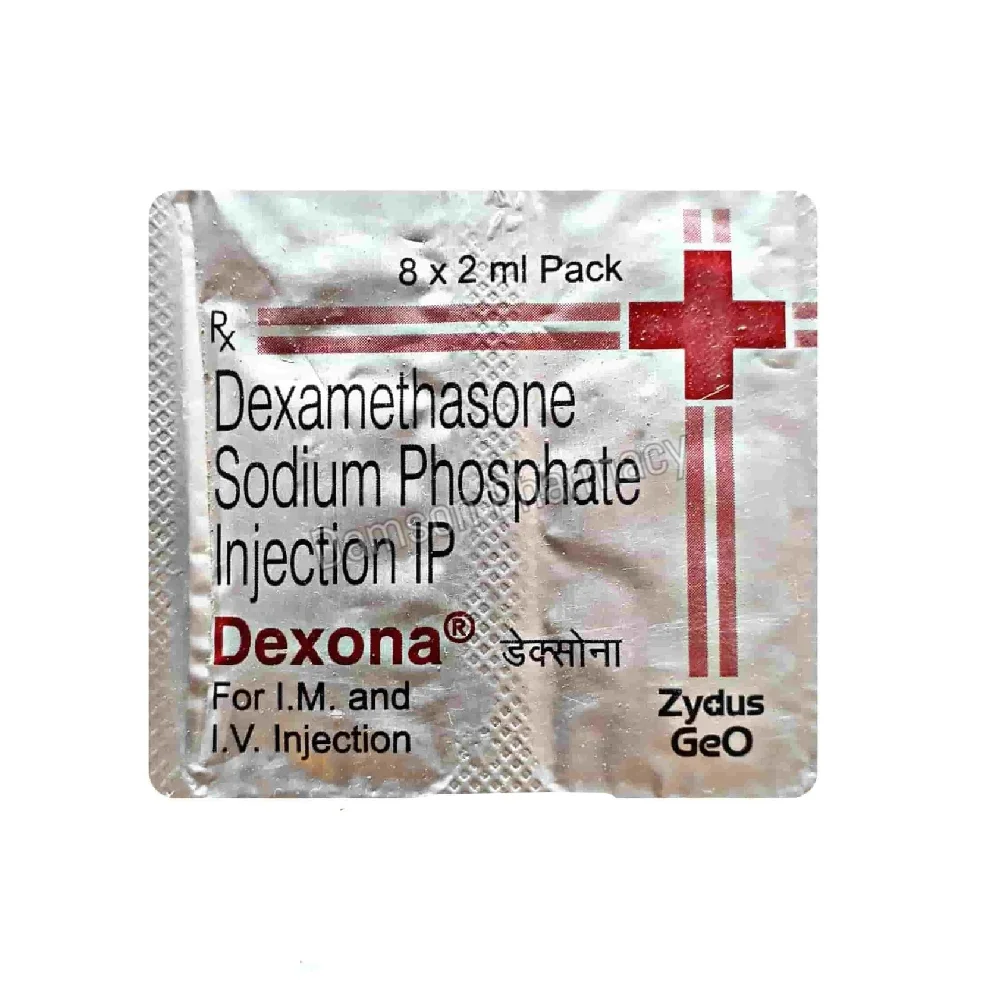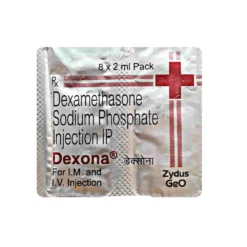Dexamethasone Injection
$22.00 – $60.00Price range: $22.00 through $60.00
| Pack Size | Price | Price / Unit | Quantity | |
|---|---|---|---|---|
| 40 Injections | $42.00 | $1.05/ unit | ||
| 60 Injections | $60.00 | $1.00/ unit | ||
| 20 Injections | $22.00 | $1.10/ unit |
Looking for bulk / B2B pricing? | Send Inquiry |

| SKU | 11391 |
| Manufacturer | Zydus Healthcare Limited |
| Categories | Inflammation |
| Delivery Time | 10 - 14 Working Days |
| Strength | 2ml |
Introduction to Dexamethasone Injection
Dexamethasone Injection is a corticosteroid medication commonly administered to reduce inflammation and treat various medical conditions. It is widely used in hospital and clinical settings due to its rapid onset of action. This injectable form allows for precise dosing and faster results.
This medication is prescribed in a range of situations, including allergic reactions, autoimmune disorders, and certain types of cancer. Its versatility makes it an essential drug in emergency medicine, as well as in the treatment of chronic conditions requiring inflammation control.
Healthcare professionals may choose Dexamethasone Injection for patients who are unable to take oral medications. It is available in different strengths and can be given through various routes, including intravenous or intramuscular injection, depending on the clinical scenario.
Uses of Dexamethasone Injection
Dexamethasone Injection is used to treat a variety of medical conditions, primarily those involving inflammation, immune system responses, or hormone imbalances. Some common uses include:
- Severe Allergic Reactions
- Autoimmune Diseases
- Cancer Treatment
- Endocrine Disorders
- Respiratory Illnesses
How Does Dexamethasone Injection Works?
Dexamethasone Injection works by mimicking the effects of cortisol, a natural steroid hormone produced by the adrenal glands. It binds to glucocorticoid receptors in the body, influencing gene expression and protein production that help suppress inflammation and immune system activity at the cellular level.
This action leads to a reduction in the release of inflammatory chemicals and minimizes the immune system’s overactivity. As a result, swelling, redness, and pain are controlled in various medical conditions, providing relief in cases such as allergic reactions, autoimmune diseases, and severe respiratory issues.
Side Effects of Dexamethasone
- Gastrointestinal Issues
- Increased Blood Sugar
- Mood Changes
- Weight Gain and Swelling
- Weakened Immune System
- Bone and Muscle Effects
- Eye Problems
Dosage of Dexamethasone injection
The dosage of Dexamethasone Injection varies based on the condition being treated, the patient’s age, weight, and response to therapy. In emergency situations, such as severe allergic reactions or brain swelling, higher doses may be administered initially to achieve rapid effects.
For chronic conditions, lower doses are usually prescribed and tapered gradually to minimize potential side effects. Dexamethasone Injection can be given intravenously or intramuscularly, and the frequency may range from a single dose to repeated injections over several days.
How To Manage Side Effects?
- Regular Monitoring
- Take With Food
- Stay Hydrated & Active
- Bone Health Support
- Manage Mood Changes
- Infection Precautions
- Tapering the Dose
Warnings & Precautions
Dexamethasone is a potent corticosteroid, and its use requires careful consideration of warnings, precautions, and potential risks. Here are some important warnings and precautions associated with dexamethasone injection:
1. Infections:
- Dexamethasone can suppress the immune system, increasing the risk of infections. Use caution in individuals with existing infections, and monitor for signs of new infections. Avoid live vaccines during treatment.
2. Adrenal Suppression:
- Prolonged use of dexamethasone can suppress the natural production of cortisol by the adrenal glands. Abrupt discontinuation of the medication can lead to adrenal insufficiency. Tapering the dosage under the guidance of a healthcare provider is essential.
3. Hyperglycemia:
- Dexamethasone can increase blood glucose levels, posing a risk for individuals with diabetes or those predisposed to glucose intolerance. Regular monitoring of blood sugar levels is recommended, and adjustments to diabetes medications may be necessary.
4. Cardiovascular Effects:
- Use caution in individuals with a history of cardiovascular disease, as dexamethasone can contribute to an increase in blood pressure. Regular monitoring of blood pressure is advised.
5. Osteoporosis:
- Long-term use of dexamethasone can lead to a reduction in bone density, increasing the risk of osteoporosis and fractures. Adequate calcium and vitamin D intake, as well as weight-bearing exercises, may help mitigate this risk.
6. Psychiatric Effects:
- Use caution in individuals with a history of psychiatric disorders, as dexamethasone may cause or exacerbate mood disorders. Regular monitoring for mood changes and open communication with a healthcare provider are important.
Storage
- Store Dexamethasone Injection at a controlled room temperature, typically between 20°C to 25°C (68°F to 77°F). Avoid exposing it to extreme heat or freezing conditions.
- Keep the vial away from direct sunlight and bright light to preserve its effectiveness. Store it in its original packaging when not in use.
- Ensure the storage area is dry and clean. Store the medication in a secure place out of reach of children and pets.
- Do not use the injection past its expiration date. Discard any discolored or cloudy solution, or if particles are visible. Follow local guidelines for safe medication disposal.
Frequently Asked Questions
1. How Is Dexamethasone Injection Typically Administered By Healthcare Professionals?
Ans. Dexamethasone Injection is usually administered by a doctor or nurse either intravenously (IV) into a vein or intramuscularly (IM) into a muscle. The exact route depends on the condition being treated and how quickly the medication needs to act.
2. Can I Use Dexamethasone Injection Without A Prescription Or Doctor’s Supervision?
Ans. No, Dexamethasone Injection should never be used without a doctor’s prescription and supervision. Improper use can lead to serious side effects, hormone imbalances, or suppression of your body’s natural steroid production.
3. How Long Does Dexamethasone Injection Take To Start Working In The Body?
Ans. Dexamethasone Injection usually begins to work within a few hours, especially when given intravenously. However, the full effect may take longer depending on the medical condition being treated and the dosage used.
4. Are There Any Foods Or Drinks I Should Avoid While Receiving Dexamethasone Injection?
Ans. While receiving Dexamethasone Injection, it is recommended to avoid alcohol, salty foods, and excessive sugar. These can worsen side effects like water retention, high blood pressure, and increased blood sugar levels.
| Pack Size | 40 Injections, 60 Injections, 20 Injections |
|---|---|
| Price/Unit | $1.00/unit, $1.05/unit, $1.10/unit |
5 reviews for Dexamethasone Injection
Add a review Cancel reply
Related Products
No related Products Found









Charl –
Fast, accurate information
Martin –
Extremely helpful and efficient service. Crucial in times like these.
Merrick –
I had severe joint inflammation and got a Dexamethasone injection. Within hours, I felt a huge difference – pain and swelling were reduced dramatically. Packaging was safe and delivery was on time.
Bodie Martinez –
I get valuable information on health maintenance in your website and medicine also worked as described.
Jame S –
Reliable and honest online company, Great value ever.